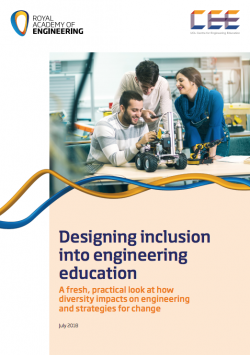2 minute read
Practical action needed to make engineering education more inclusive
Leaders and educators in engineering in all higher education establishments should develop a five-year action plan for inclusive engineering education, according to a report published by the Royal Academy of Engineering and the UCL Centre for Engineering Education.
The report, Designing inclusion into engineering education, offers a practical look at how diversity impacts on engineering and offers universities strategies for change that they can use in designing their courses. It also calls for professional bodies and learned societies to commit resources to address the knowledge and information gaps for inclusion and funding to be allocated for benchmarking inclusive education best practice.

Royal Academy of Engineering & UCL report calls for engineering education to be more inclusive / Picture: Getty/iStock
The report proposes a model that breaks down all the elements of creating and delivering an engineering education to help departments to find positive solutions and to provide ideas for further consideration. It offers a structured approach to enable every department, school and or faculty to increase inclusion and diversity with the following objectives:
• Extending excellence in the teaching of engineering and technology to address diversity and inclusion
• Creating a safe and welcoming place that meets the diverse needs of students and educators
• Providing space for students to feel like they belong and can practice professional skills, including inclusive behaviours that will serve them as future managers/leaders
• Growing career confidence of all students to make the most of the talent within engineering
• Encouraging innovation and diversity in solutions to problems
The Academy hopes to recruit universities to co-create and trial resources and materials to help to implement this model of an inclusive engineering education.
Some 15,000 UK residents graduated from UK engineering courses in 2015/16: 14.6% of these students were female and 26.1% were from black and ethnic minority backgrounds. However, previous Academy research has highlighted unequal employment outcomes for engineering graduates both from ethnic minority backgrounds and from newer universities attended by less affluent students. Through its Graduate Engineering Employment Programme, the Academy is working to create a more level playing field for all engineering graduates seeking employment.
Report author Dr Jan Peters said: “Addressing inclusion in engineering education is not political correctness, it is vital for us to address the skills gap with the numbers of women and black and minority ethic students being so low. At each level of course conception, design and delivery we need to be open to how we can be address inclusion within engineering design, and have conversations with students about this. We need to give students the opportunities to practice giving and receiving feedback so they grow as individuals.”
Bola Fatimilehin, Head of Diversity and Inclusion at the Royal Academy of Engineering, added: “Creating quality engineers with an inclusive mindset who will go on to advance the profession and be exceptional engineers, managers and leaders is good for the profession. To recruit more diverse cohorts, we need to ensure that departmental and tutor group level cultures are inclusive so that each student can achieve to the best of their ability.”
